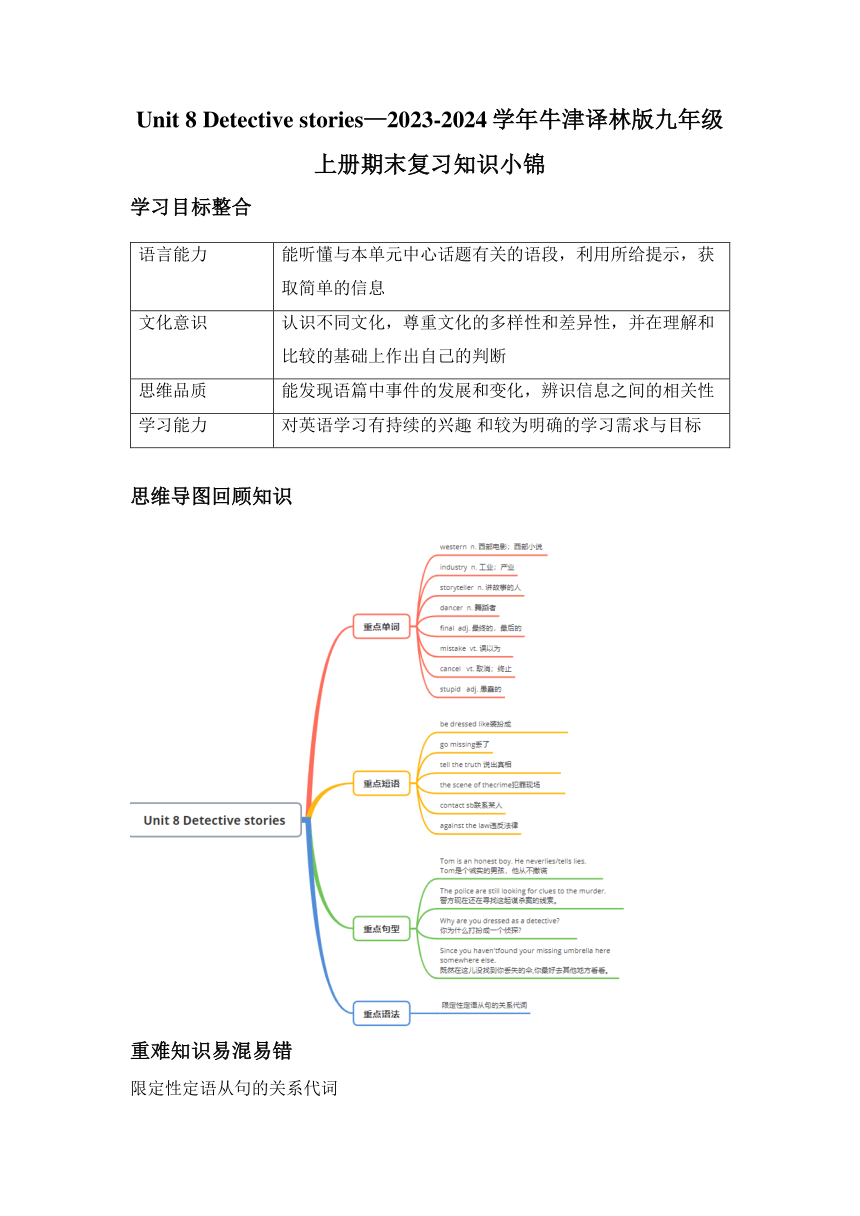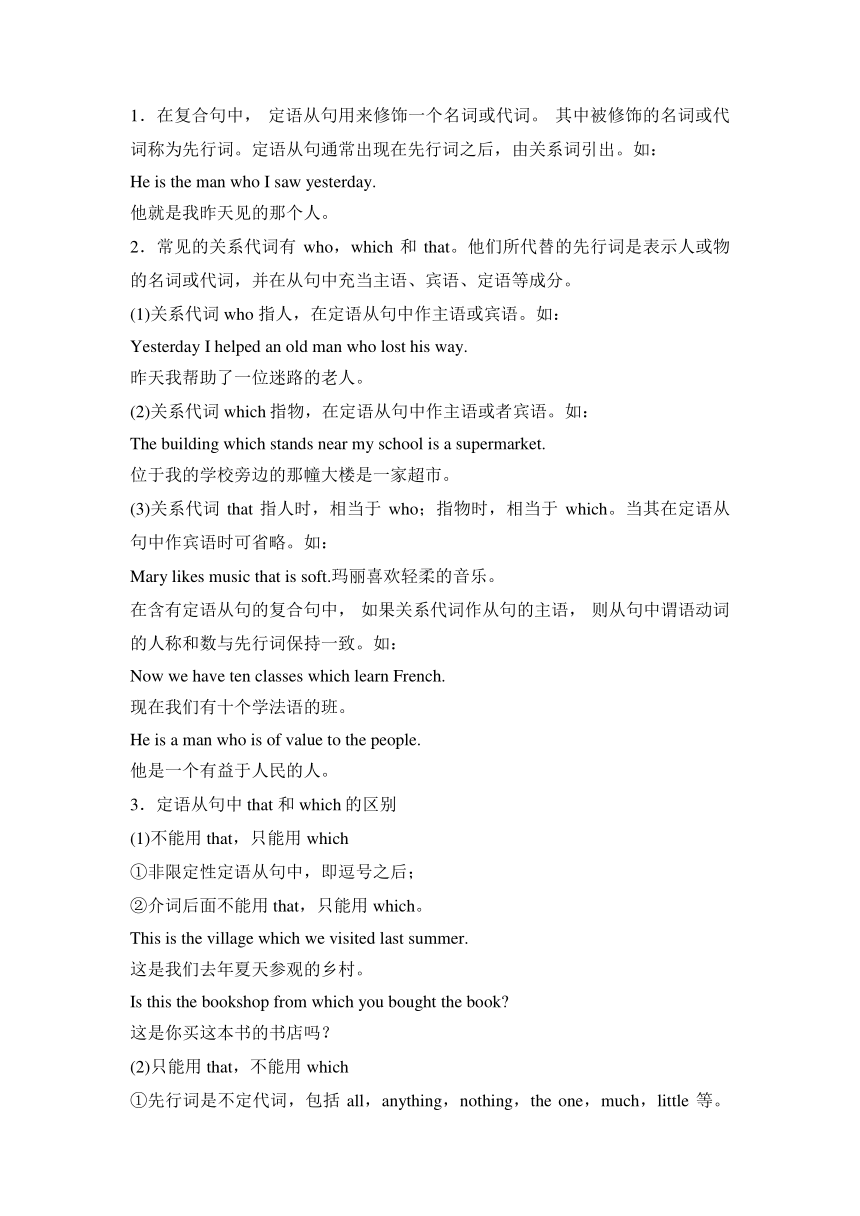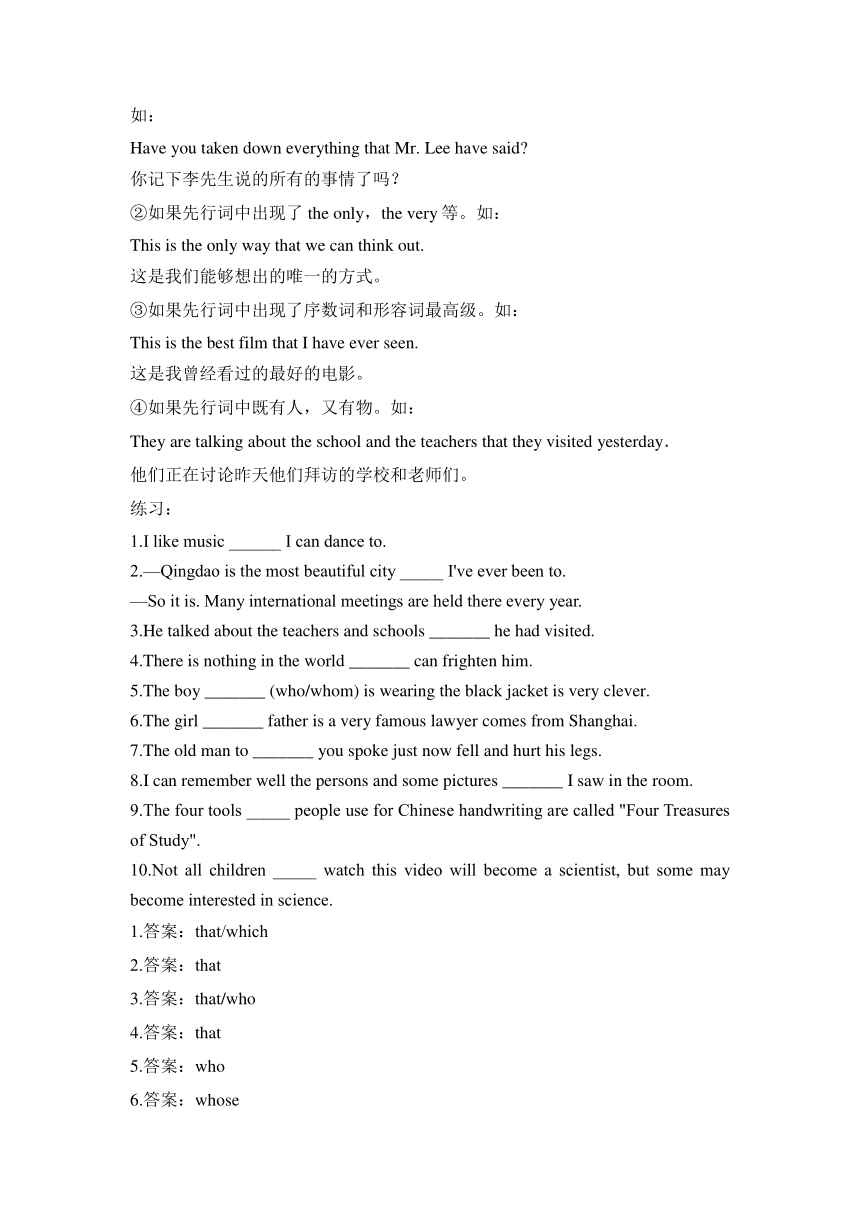Unit 8 Detective stories期末复习知识小锦+练习(含解析)
文档属性
| 名称 | Unit 8 Detective stories期末复习知识小锦+练习(含解析) |

|
|
| 格式 | docx | ||
| 文件大小 | 96.2KB | ||
| 资源类型 | 教案 | ||
| 版本资源 | 牛津译林版 | ||
| 科目 | 英语 | ||
| 更新时间 | 2023-12-09 00:00:00 | ||
图片预览



文档简介
Unit 8 Detective stories—2023-2024学年牛津译林版九年级上册期末复习知识小锦
学习目标整合
语言能力 能听懂与本单元中心话题有关的语段,利用所给提示,获取简单的信息
文化意识 认识不同文化,尊重文化的多样性和差异性,并在理解和比较的基础上作出自己的判断
思维品质 能发现语篇中事件的发展和变化,辨识信息之间的相关性
学习能力 对英语学习有持续的兴趣 和较为明确的学习需求与目标
思维导图回顾知识
重难知识易混易错
限定性定语从句的关系代词
1.在复合句中, 定语从句用来修饰一个名词或代词。 其中被修饰的名词或代词称为先行词。定语从句通常出现在先行词之后,由关系词引出。如:
He is the man who I saw yesterday.
他就是我昨天见的那个人。
2.常见的关系代词有 who,which 和 that。他们所代替的先行词是表示人或物 的名词或代词,并在从句中充当主语、宾语、定语等成分。
(1)关系代词 who 指人,在定语从句中作主语或宾语。如:
Yesterday I helped an old man who lost his way.
昨天我帮助了一位迷路的老人。
(2)关系代词 which指物,在定语从句中作主语或者宾语。如:
The building which stands near my school is a supermarket.
位于我的学校旁边的那幢大楼是一家超市。
(3)关系代词 that 指人时,相当于 who;指物时,相当于 which。当其在定语从句中作宾语时可省略。如:
Mary likes music that is soft.玛丽喜欢轻柔的音乐。
在含有定语从句的复合句中, 如果关系代词作从句的主语, 则从句中谓语动词的人称和数与先行词保持一致。如:
Now we have ten classes which learn French.
现在我们有十个学法语的班。
He is a man who is of value to the people.
他是一个有益于人民的人。
3.定语从句中 that 和 which的区别
(1)不能用 that,只能用 which
①非限定性定语从句中,即逗号之后;
②介词后面不能用 that,只能用which。
This is the village which we visited last summer.
这是我们去年夏天参观的乡村。
Is this the bookshop from which you bought the book
这是你买这本书的书店吗?
(2)只能用 that,不能用 which
①先行词是不定代词,包括 all,anything,nothing,the one,much,little 等。如:
Have you taken down everything that Mr. Lee have said
你记下李先生说的所有的事情了吗?
②如果先行词中出现了 the only,the very等。如:
This is the only way that we can think out.
这是我们能够想出的唯一的方式。
③如果先行词中出现了序数词和形容词最高级。如:
This is the best film that I have ever seen.
这是我曾经看过的最好的电影。
④如果先行词中既有人,又有物。如:
They are talking about the school and the teachers that they visited yesterday.
他们正在讨论昨天他们拜访的学校和老师们。
练习:
1.I like music ______ I can dance to.
2.—Qingdao is the most beautiful city _____ I've ever been to.
—So it is. Many international meetings are held there every year.
3.He talked about the teachers and schools _______ he had visited.
4.There is nothing in the world _______ can frighten him.
5.The boy _______ (who/whom) is wearing the black jacket is very clever.
6.The girl _______ father is a very famous lawyer comes from Shanghai.
7.The old man to _______ you spoke just now fell and hurt his legs.
8.I can remember well the persons and some pictures _______ I saw in the room.
9.The four tools _____ people use for Chinese handwriting are called "Four Treasures of Study".
10.Not all children _____ watch this video will become a scientist, but some may become interested in science.
1.答案:that/which
2.答案:that
3.答案:that/who
4.答案:that
5.答案:who
6.答案:whose
7.答案:whom
8.答案:that
9.答案:which/that
10.答案:who/that
单元核心素养对接中考
1.We are supposed _____ some housework with our parents when we have free time.
A. to share B. sharing C. shared D. share
2.If the weather _____to be rainy, we may have to cancel the sports meeting.
A. runs out B. breaks out C. finds out D. turns out
3.—Tomorrow is Father's Day. What's your surprise for your father
—The first thing _____ I will do is to make a card for him.
A. who B. where C. whose D. that
4.Anyone who is a server or _____has been one knows that customers always come first.
A. whom B. what C. who D. which
5.Not all children _____ watch this video will become a scientist, but some may become interested in science.
A. whom B. which C. who D. whose
6.Simon broke his leg. _____, he will have to be away from school for two or three months.
A. For a result B. As a result C. In order that D. As a result of
7.The criminal is guilty _____ the robbery. He is charged_____ robbing the bank.
A. of; with B. with; of C. for; of D. of; for
8.The necklace that I had shown to my friends _____. It made me very sad.
A. was lost B. gets lost C. were missing D. was missed
9.—That young man must have something to do with the crime, right
—_____, though he insisted he hadn't done anything against the law.
A. I don't agree B. I suppose so C. I don't think so D. He supposes so
10.—How was everything going when you studied abroad
—It was a difficult time at first, but things _____fine finally.
A. worked out B. broke out C. turned out D. tried out
答案以及解析
1.答案:A
解析:句意为: 当我们有空闲时间时, 我们应该为我们的父母分担一些家务。此处为固定短语be supposed to do sth, 意为"应该做某事", 故选A项。
2.答案:D
解析:句意: 如果最终下雨, 我们也许不得不取消运动会。run out意为 "用完", break out意为"爆发", find out意为"查明", 都不符合句意; turn out有"结果是"的意思, 符合句意。故选D。
3.答案:D
解析:考查定语从句。句意:—明天是父亲节。你给你爸爸的惊喜是什么?—我要做的第一件事就是给他做一张卡片。先行词前有序数词修饰,定语从句用关系代词that引导,故选D。
4.答案:C
解析:本题考查定语从句。句意: 任何一个服务人员或曾经做过服务员的人都知道顾客总是第一位的。先行词为Anyone, 指人, 可用关系词who或whom来引导, 由于关系词在从句中作主语, 故选C。
5.答案:C
解析:考查定语从句。句意:并不是所有观看到这个视频的孩子都会成为一名科学家,但有些或许会对科学感兴趣。分析句子结构可知,设空处引导定语从句,先行词 children指人,应用关系代词who引导定语从句。故选C。
6.答案:B
解析:as a result "结果"; as a result of "由于……"; in order that"为了"; 没有for a result这个结构。根据句意可知选B。
7.答案:A
解析:句意: 这个罪犯犯有抢劫罪。他被指控抢劫银行。be guilty of...犯有……罪; be charged with被指控, 被控告。结合句意可知, 答案为A。
8.答案:A
解析:句意: 我之前向朋友展示的那条项链不见了。这让我非常悲伤。 lose表示"丢失"时, 是及物动词。be lost被丢失了; get lost迷路; be missing丢失的; miss表示"丢失"时, 是不及物动词, 没有被动语态, 故排除D项。根据谓语动词made可知此处用一般过去时,故排除B 项。主语The necklace是第三人称单数形式, 故谓语动词用第三人称单数, 故排除C项。故选A。
9.答案:B
解析:句意: —那个年轻人一定和这次犯罪有关系, 对吗 —我认为是这样, 尽管他坚持说他没有做任何违法的事。根据语境, 可知选B。
10.答案:C
解析:根据问句可知, 此处表达的是"但是最后形势好转了"。work out意为"计算出", break out意为"爆发", try out意为"试验", 都不符合句意; turn out有"结果是"的意思, 符合句意。
学习目标整合
语言能力 能听懂与本单元中心话题有关的语段,利用所给提示,获取简单的信息
文化意识 认识不同文化,尊重文化的多样性和差异性,并在理解和比较的基础上作出自己的判断
思维品质 能发现语篇中事件的发展和变化,辨识信息之间的相关性
学习能力 对英语学习有持续的兴趣 和较为明确的学习需求与目标
思维导图回顾知识
重难知识易混易错
限定性定语从句的关系代词
1.在复合句中, 定语从句用来修饰一个名词或代词。 其中被修饰的名词或代词称为先行词。定语从句通常出现在先行词之后,由关系词引出。如:
He is the man who I saw yesterday.
他就是我昨天见的那个人。
2.常见的关系代词有 who,which 和 that。他们所代替的先行词是表示人或物 的名词或代词,并在从句中充当主语、宾语、定语等成分。
(1)关系代词 who 指人,在定语从句中作主语或宾语。如:
Yesterday I helped an old man who lost his way.
昨天我帮助了一位迷路的老人。
(2)关系代词 which指物,在定语从句中作主语或者宾语。如:
The building which stands near my school is a supermarket.
位于我的学校旁边的那幢大楼是一家超市。
(3)关系代词 that 指人时,相当于 who;指物时,相当于 which。当其在定语从句中作宾语时可省略。如:
Mary likes music that is soft.玛丽喜欢轻柔的音乐。
在含有定语从句的复合句中, 如果关系代词作从句的主语, 则从句中谓语动词的人称和数与先行词保持一致。如:
Now we have ten classes which learn French.
现在我们有十个学法语的班。
He is a man who is of value to the people.
他是一个有益于人民的人。
3.定语从句中 that 和 which的区别
(1)不能用 that,只能用 which
①非限定性定语从句中,即逗号之后;
②介词后面不能用 that,只能用which。
This is the village which we visited last summer.
这是我们去年夏天参观的乡村。
Is this the bookshop from which you bought the book
这是你买这本书的书店吗?
(2)只能用 that,不能用 which
①先行词是不定代词,包括 all,anything,nothing,the one,much,little 等。如:
Have you taken down everything that Mr. Lee have said
你记下李先生说的所有的事情了吗?
②如果先行词中出现了 the only,the very等。如:
This is the only way that we can think out.
这是我们能够想出的唯一的方式。
③如果先行词中出现了序数词和形容词最高级。如:
This is the best film that I have ever seen.
这是我曾经看过的最好的电影。
④如果先行词中既有人,又有物。如:
They are talking about the school and the teachers that they visited yesterday.
他们正在讨论昨天他们拜访的学校和老师们。
练习:
1.I like music ______ I can dance to.
2.—Qingdao is the most beautiful city _____ I've ever been to.
—So it is. Many international meetings are held there every year.
3.He talked about the teachers and schools _______ he had visited.
4.There is nothing in the world _______ can frighten him.
5.The boy _______ (who/whom) is wearing the black jacket is very clever.
6.The girl _______ father is a very famous lawyer comes from Shanghai.
7.The old man to _______ you spoke just now fell and hurt his legs.
8.I can remember well the persons and some pictures _______ I saw in the room.
9.The four tools _____ people use for Chinese handwriting are called "Four Treasures of Study".
10.Not all children _____ watch this video will become a scientist, but some may become interested in science.
1.答案:that/which
2.答案:that
3.答案:that/who
4.答案:that
5.答案:who
6.答案:whose
7.答案:whom
8.答案:that
9.答案:which/that
10.答案:who/that
单元核心素养对接中考
1.We are supposed _____ some housework with our parents when we have free time.
A. to share B. sharing C. shared D. share
2.If the weather _____to be rainy, we may have to cancel the sports meeting.
A. runs out B. breaks out C. finds out D. turns out
3.—Tomorrow is Father's Day. What's your surprise for your father
—The first thing _____ I will do is to make a card for him.
A. who B. where C. whose D. that
4.Anyone who is a server or _____has been one knows that customers always come first.
A. whom B. what C. who D. which
5.Not all children _____ watch this video will become a scientist, but some may become interested in science.
A. whom B. which C. who D. whose
6.Simon broke his leg. _____, he will have to be away from school for two or three months.
A. For a result B. As a result C. In order that D. As a result of
7.The criminal is guilty _____ the robbery. He is charged_____ robbing the bank.
A. of; with B. with; of C. for; of D. of; for
8.The necklace that I had shown to my friends _____. It made me very sad.
A. was lost B. gets lost C. were missing D. was missed
9.—That young man must have something to do with the crime, right
—_____, though he insisted he hadn't done anything against the law.
A. I don't agree B. I suppose so C. I don't think so D. He supposes so
10.—How was everything going when you studied abroad
—It was a difficult time at first, but things _____fine finally.
A. worked out B. broke out C. turned out D. tried out
答案以及解析
1.答案:A
解析:句意为: 当我们有空闲时间时, 我们应该为我们的父母分担一些家务。此处为固定短语be supposed to do sth, 意为"应该做某事", 故选A项。
2.答案:D
解析:句意: 如果最终下雨, 我们也许不得不取消运动会。run out意为 "用完", break out意为"爆发", find out意为"查明", 都不符合句意; turn out有"结果是"的意思, 符合句意。故选D。
3.答案:D
解析:考查定语从句。句意:—明天是父亲节。你给你爸爸的惊喜是什么?—我要做的第一件事就是给他做一张卡片。先行词前有序数词修饰,定语从句用关系代词that引导,故选D。
4.答案:C
解析:本题考查定语从句。句意: 任何一个服务人员或曾经做过服务员的人都知道顾客总是第一位的。先行词为Anyone, 指人, 可用关系词who或whom来引导, 由于关系词在从句中作主语, 故选C。
5.答案:C
解析:考查定语从句。句意:并不是所有观看到这个视频的孩子都会成为一名科学家,但有些或许会对科学感兴趣。分析句子结构可知,设空处引导定语从句,先行词 children指人,应用关系代词who引导定语从句。故选C。
6.答案:B
解析:as a result "结果"; as a result of "由于……"; in order that"为了"; 没有for a result这个结构。根据句意可知选B。
7.答案:A
解析:句意: 这个罪犯犯有抢劫罪。他被指控抢劫银行。be guilty of...犯有……罪; be charged with被指控, 被控告。结合句意可知, 答案为A。
8.答案:A
解析:句意: 我之前向朋友展示的那条项链不见了。这让我非常悲伤。 lose表示"丢失"时, 是及物动词。be lost被丢失了; get lost迷路; be missing丢失的; miss表示"丢失"时, 是不及物动词, 没有被动语态, 故排除D项。根据谓语动词made可知此处用一般过去时,故排除B 项。主语The necklace是第三人称单数形式, 故谓语动词用第三人称单数, 故排除C项。故选A。
9.答案:B
解析:句意: —那个年轻人一定和这次犯罪有关系, 对吗 —我认为是这样, 尽管他坚持说他没有做任何违法的事。根据语境, 可知选B。
10.答案:C
解析:根据问句可知, 此处表达的是"但是最后形势好转了"。work out意为"计算出", break out意为"爆发", try out意为"试验", 都不符合句意; turn out有"结果是"的意思, 符合句意。
